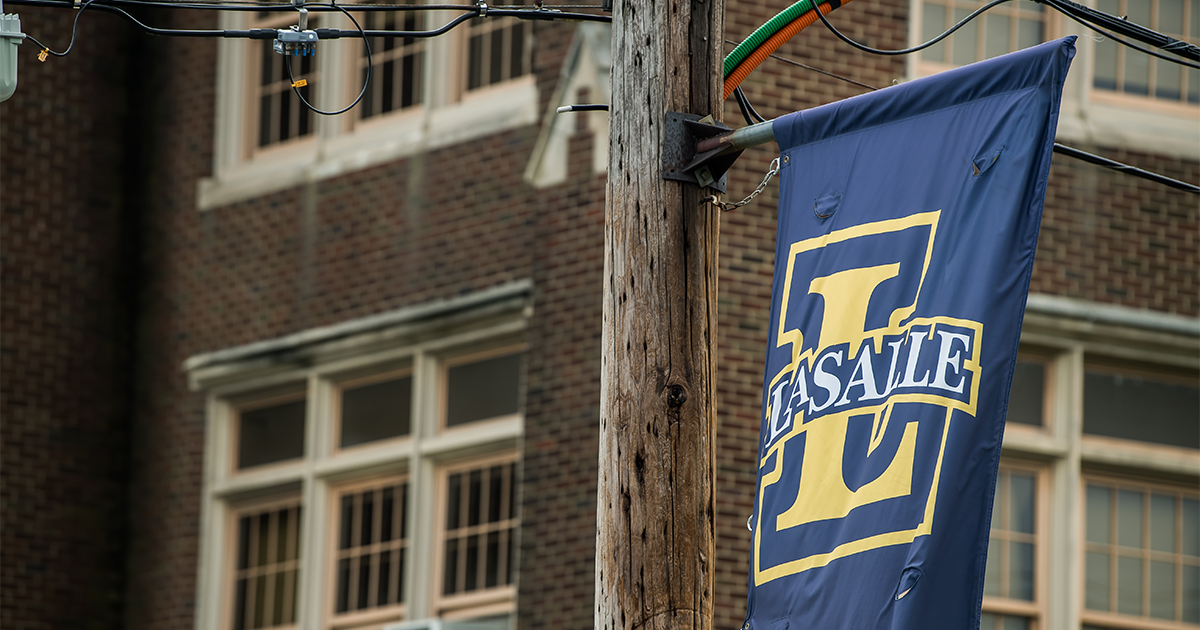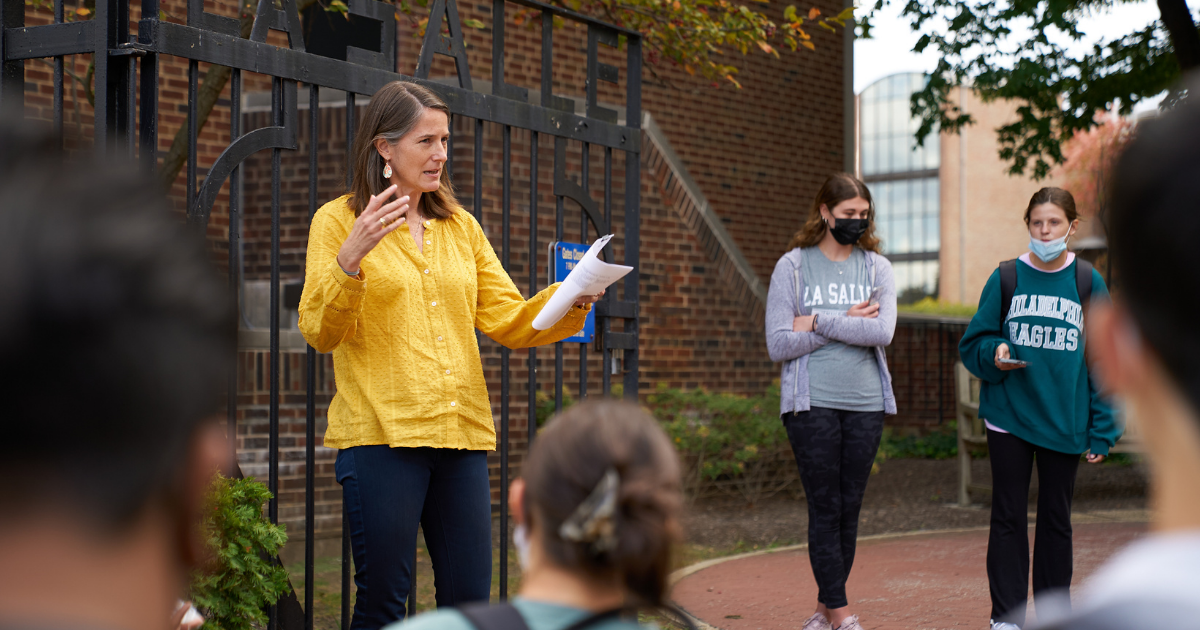La Salle University
Being a good Northwest Philadelphia neighbor
La Salle University has called Northwest Philadelphia’s historic Belfield neighborhood its home since 1930. Others call it home, too.
That’s an important detail to remember, as students move in and out of off-campus residences, and faculty and staff travel about the neighborhood regularly. This requires everyone to be a respectful and knowledgeable member of the community.
Here are a few tips, for the members of La Salle’s community, on being a good neighbor to La Salle’s neighbors in Northwest Philadelphia, Belfield, and the surrounding residential pockets:
Educate yourself on the community
Whether you live, learn, or work at La Salle, it’s important to become familiar with the surrounding area.
Educate yourself on the places that surround campus. Information about Northwest Philadelphia and the Belfield neighborhood is included in La Salle’s orientation for new undergraduate students, called Explorientation, said Cherylyn Rush, director of multicultural affairs in the Multicultural and International Center.
Maureen O’Connell, Ph.D., an associate professor of religion and theology, leads a first-year seminar that analyzes the Belfield neighborhood’s religious identity and sense of belonging, while examining its history, beliefs, values, and diverse cultures. There’s value, she believes, in having members of La Salle’s community immerse themselves in information outside of required programs.
“Look for the assets in our neighborhood—people, spaces, activities, histories, cultures, artistic expression,” said O’Connell, whose course is titled ‘Welcome to Belfield’. “And then amplify them with your own unique assets.”
La Salle students, staff, and faculty also can dive into historic material related to Belfield and the greater Germantown area at Connelly Library, said Heather Willever-Farr, Ph.D., special collections librarian. More resources on the history of Belfield and La Salle’s related historic collections are available through the library’s Special Collections homepage.
Willever-Farr also suggested the La Salle local history library guide to learn about local history.
Get involved
La Salle offers a variety of service programs to create an impact in its neighboring community.
The University’s Community Building Team (CBT) brings together members of La Salle’s campus community with Belfield’s permanent residents for involvement in annual and semi-regular events. These include signature programs like the Community Health Fair each fall, as well as multiple Trash Bashes each semester. An annual Martin Luther King Jr. Interfaith Service, a near-decade-long tradition held in January, has been on hold recently due to the pandemic.
The CBT also has partnered with the University’s men’s basketball team for a community day. While the COVID-19 pandemic has put much of the CBT’s work on hold, residence life director, TiRease Holmes is hopeful of its return in 2022.
Toya Algarin, ’92, has been a resident in La Salle’s neighboring community since birth. She encouraged students to always care for the community and keep in mind its permanent residents. The return of La Salle’s Community Building Team will act as a reminder for students, she said, of the courtesies that should be at the forefront of their minds.
“If you’re going to live in the neighborhood, you need to respect the neighborhood,” she added.
Simple gestures go a long way
When traveling to and from campus, you are passing through a community and turning down streets that others call home 12 months out of the year.
Keeping streets and sidewalks free of litter and obstructions and being mindful of noise levels are key in these residential areas. And remember that someone lives in the homes you pass, so don’t do anything on or to personal property that you wouldn’t want done to yours.
A smile, a nod, or a simple greeting can go a long way, too.
“Look for the assets in our neighborhood—people, spaces, activities, histories, cultures, artistic expression,” said Maureen O’Connell, Ph.D., an associate professor of religion and theology. “And then amplify them with your own unique assets.”
“I always make an effort to smile at people,” said Isabelle Pope, ’22, a communications sciences and disorders major. Pope, the president of La Salle’s Students’ Government Association, said she often makes conversation with residents about their day-to-day lives while walking her dog around the neighborhood.
“If the opportunity to learn someone else’s story presents itself, take it,” O’Connell said. “We’ve all got stories to share and we all feel valued when someone wants to hear our story.”
Keep communication open
Whether it’s a message of praise or constructive feedback, it’s important for La Salle and its neighbors to maintain open lines of communication.
“We are open and available to community residents,” said Ben Oser, the University’s assistant director of commuter and off-campus outreach.
Oser said residents have a way to communicate with the University via phone or online, making it easier for them to get a response and have the University address issues. They can email the Commuter Engagement Office at livingoffcampus@lasalle.edu or call the office at 215-991-2873. After emailing or calling, a review takes place to determine next steps. If a permanent resident feels like the matter is emergent, they are encouraged to work with La Salle Public Safety by calling 215-951-1300.
Helping your neighbors means connecting with them regularly. La Salle maintains existing relationships and fosters new ones with nearby schools, organizations, and residents, when it comes to planning events or simply asking questions about the University’s role with community partners, Rush said. Those relationships, O’Connell said, are important to strengthening La Salle’s ties to its neighbors.
“When you notice a fracture in our community—a tension, some kind of disparity, or something that seems to disconnect us from each other—get curious about it,” she said. “For example, ask yourself why that disconnect might be happening or try to identify the root cause of the tension. Then, try to imagine how we might use the resources of our University community to address that root cause in order to reconnect people.”
Holmes also noted it’s important to remember the Christian Brothers’ approach to “together and by association.”
“Instead of only looking for opportunities to ‘do for,’ look for opportunities to ‘do with, together and by association.’ The impact is all the greater,” she said.
Be courteous and respectful
For students, your time at La Salle is finite. You graduate, your off-campus lease ends, and you move on. Being a part of a university community has an end date; being a permanent resident of the Belfield neighborhood does not.
“We live in and around their neighborhood,” said Oser.
It’s up to La Salle students, said Emily Dorr, ’22, a religion and history major, to uphold the University’s values both on and off campus. Dorr is also the vice president of the Students’ Government Association.
“La Salle means a lot to me, and I would never want a Germantown or Belfield resident to feel uncomfortable in their own neighborhood,” she said. “We can and should take this opportunity to reinforce what being a good neighbor looks within our community.”
—Meg Ryan

